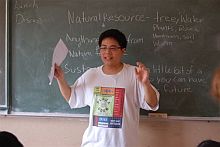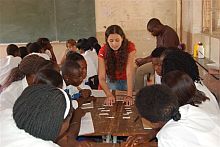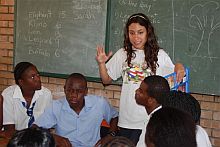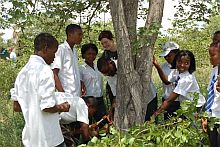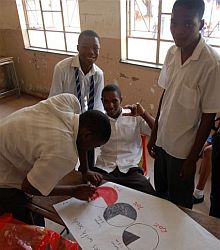SAEON Ndlovu and OTS contribute to Outcome Based Education
|
- Joe Sibiya, Education Outreach Officer, SAEON Ndlovu Node
In January this year, the SAEON Ndlovu Node in Phalaborwa and the Organization for Tropical Studies (OTS) discussed the possibility of future collaboration in the education outreach projects of the two organisations.
OTS, a consortium of over 60 universities in the US, Latin America, Australia and South Africa has its headquarters in North American at Duke University, North Carolina. Key aims of the OTS education outreach programme include setting high academic standards, with strong emphasis on scientific research, by actively encouraging student involvement and training students to perform ecological research.
As the SAEON Ndlovu Node found the aims of the OTS programme to be in line with SAEON’s environmental science education and outreach objectives, we agreed to collaborate with OTS in implementing a science project at Majeje High School, which has diverse vegetation dominated by mopane trees. Another aspect that counted in Majeje’s favour is that the Ndlovu Node had established monitoring project plots on the school grounds in the course of last year.
‘Sustainable Use of Natural Resources’ was chosen as the theme for the project, using the mopane tree as a local example.
The project was implemented on the 8th, 9th and 10th of February. The three days were divided into three sessions - Curriculum Review, Lesson Planning and On-site Project Implementation (teaching at school). The Curriculum Review workshop was conducted out of the Wits Rural Facility. Nikki Stevens of the SAEON Ndlovu Node gave a talk on the ecology of mopane as background information for the OTS students to base their lesson on.
The SAEON Ndlovu Node educators team, which consisted of Margareth Raganya of Majeje High School, Pulane Mokgalabone of Lepato High School and Moses Shitlhelana of Nkateko High School, acted as education experts (advisors) for the OTS students. They displayed great professionalism in guiding the students on how to prepare and teach lessons in the Life Sciences and critiqueing students’ micro-lesson presentations.
Monday 9 February was left to the students to prepare the actual lessons which they were to deliver on Tuesday 10 February.
Interactive teaching/learning
On Tuesday morning the OTS students’ teaching experience began as they took charge of the four grade 10 classes at Majeje, while the educators observed the day’s proceedings unfold. The teaching-learning exercise was interactive and included practical fieldwork activities.
It was evident that the learners enjoyed and “owned” the learning proceedings as some voluntarily assumed leadership roles in their groups in the classroom as well as in fieldwork activities. At 11 o’clock the learners and their visiting teachers braved the Phalaborwa heat and took to the field to collect data on mopane trees before returning to the classrooms to analyse the data they had collected.
The exercise revealed gaps that educators still have to fill and the long road they still have to walk to successfully implement the Outcomes Based Education Curriculum.
The project turned out to be an overwhelming success for both OTS students and Majeje High School learners, to such an extent that SAEON and OTS plan to turn it into an annual event and expand it to other schools in SAEON’s education outreach programme.
Summary of the project - authored by OTS students
Outcome Based Education for Grade 10 Learners
- Keaton Forrester, Elizabeth Hall, Pen-Yuan Hsing and Stephanie Williams
Aims of OTS lesson plan
South Africa has an outcomes based education system aimed at continuously assessing the students’ learning.
The OTS lesson plan is designed to target Learning Outcome 1 and Assessment Standards 1 and 3, as well as Learning Outcome 3 and Assessment Standards 2 and 3. Accordingly, the objectives of the lesson plan should be to give students a strong understanding of how to propose and conduct a scientific investigation, organise and interpret the data collected, communicate scientific research and findings clearly to others, understand the social and environmental significance of science, and develop an appreciation for the discipline.
The teacher should accomplish these objectives through lectures on sustainable use of natural resources, the scientific method, and hands-on fieldwork. Specifically, this lesson plan emphasises the ecological and economic roles of the mopane tree, and applying science to develop sustainable management of this important resource.
Summary of OTS activity in the classroom at Majeje High School
During the first faculty field project with the Organization for Tropical Studies (OTS) on 10 February 2009, twenty-four participants entered four tenth-grade classes at Majeje High School in Lulekani township at Phalaborwa and taught one day of field biology.
There were six OTS participants in each classroom of 50 learners, one observing and taking notes throughout the day and the other five teaching.The lesson plan consisted of an entire day of lectures, activities and fieldwork. The day began with a quick introduction of the OTS participants (henceforth known as the ‘teachers’), followed by an icebreaker in groups.
In two of the classes the learners were allowed to group themselves, while the other two classes of learners were grouped randomly by the teachers. All the groups were composed of ten students and one teacher each. Following the icebreaker, the learners remained in their groups where they listened to lectures on the scientific method, ecology and importance of the mopane tree, and sustainable use of resources.
In between each lecture, the learners worked with their groups on an activity relevant to the most recent lecture. After a morning of lectures and learning activities, the students were dismissed for their long break. When they returned, they were introduced to the field project and taken outside in groups to collect data on mopane trees on the school grounds.
The rest of the day consisted of organising, analysing and presenting the data in groups to the entire class.
Positive feedback
We found that dividing the learners into equal groups was really effective. The learners seemed to be more engaged in smaller groups and were allowed more hands-on participation with the activities than if the activities were completed as an entire class.
The groups worked best when the teachers divided the learners into groups rather than allowing them to form their own groups. Systematically dividing the group helped eliminate a gender division in the classroom, worked to even out participation among the groups, and allowed diversity of learners in each group so that they could balance each others’ strengths and weaknesses.
Alternating lectures and activities in the morning also worked well to keep the learners motivated. The activities stimulated the learners and emphasised the points made in the lectures. Each lecture topic should have at least one activity to help strengthen the main ideas covered by the lecture. Teachers should also strive to make the lectures interactive by asking their students questions to strengthen their understanding of the topic and to better ensure their engagement.
The jelly bean game that incorporated the idea of sustainable use was extremely effective and we felt that it was the strongest activity of the whole day. A questionnaire that reviewed the topics of the lectures (scientific method, mopane ecology, and sustainability) was passed out to each group at the end of the morning before fieldwork. This helped enforce the information taught and made the students think critically about the lectures.
The fieldwork was also very effective in groups. We found through trial and error that it was best to keep the group together during fieldwork instead of dividing the group into pairs to collect data. The learners worked best in a group during fieldwork if each group worked together on one tree at a time and each student had a different task to perform. For example, two learners measured the tree, a few checked the tree for mopane worm eggs and seeds, and another wrote down all the information collected. Giving each learner a specific task allows each learner to participate and engage in the fieldwork.
Assigning specific data to each group for analysis was also effective as it allowed a more personal interaction between the data and each learner. Allowing learners to present their data to the class helped solidify their understanding of the data they analysed, take ownership of it, and offered them a chance to practise their presentation skills.
Because the learners were able to explain their results in a comprehensible manner to their peers, the class was able to better grasp the main concepts of the day.
OTS participation suggestions
Our group really enjoyed running this project and strongly recommend that OTS continue to work with this high school in the future. It was not only beneficial for the high school learners, but it was also extremely educational for the OTS participants.
Our participation at Majeje High School hopefully helped to motivate the learners toward science and also allowed us to realise the importance of sharing our knowledge and enthusiasm for the discipline.
We suggest the possibility of extending our teaching at the school to a period of two or three days so that we can get a better feel for teaching and so that the learners can become more acclimated to us. This may also help the learners understand the concepts better because we will have much more time to go over the material thoroughly with them.
Overall, the consensus of our OTS class is that the project was phenomenally successful.


